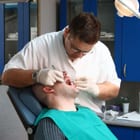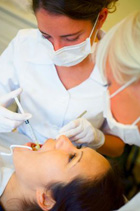 Every tooth in your mouth is a hollow chamber that contains an amount of materials that are important to the health of the tooth. In certain circumstances this material can become compromised and treatment might be required to save the tooth. This is called pulpitis and dentists in central Leeds are experts at spotting the signs of the condition and dealing with it.
Every tooth in your mouth is a hollow chamber that contains an amount of materials that are important to the health of the tooth. In certain circumstances this material can become compromised and treatment might be required to save the tooth. This is called pulpitis and dentists in central Leeds are experts at spotting the signs of the condition and dealing with it.
There are basically two types of pulpitis and the designation concerns how far advanced the condition is. Reversible pulpitis can still be dealt with the dentist but if the condition has existed for some time then it might be irreversible.
It is common for pulpitis to occur because of a cavity in the tooth that is allowing outside elements to interfere with the pulp. You will know that you are suffering from pulpitis in one of your teeth if it is unduly sensitive to changes in temperature or even simply to the touch. It is vital that the cavity is filled and dentists usually use cosmetic bonding techniques to do so. If the pulpitis is reversible then the pulp will be able to heal itself once the cavity is filled, stopping the exposure.
Your dentist might need to take an x-ray of the tooth in order to get an appreciation of the situation inside the tooth. If the pulp is severely affected then root canal treatment can be administered, allowing the dentist to clear the pulp chamber of infected material and return it to health.





 Inside all of your teeth there is a substance known as pulp. This consists of blood vessels, nerves and other cells. It can become inflamed as a result of tooth decay or a one off accident. The good news is that, in many cases, this pulpitis is actually completely reversible so you should keep your dentist up to date with what is going on in your mouth in case you develop it.
Inside all of your teeth there is a substance known as pulp. This consists of blood vessels, nerves and other cells. It can become inflamed as a result of tooth decay or a one off accident. The good news is that, in many cases, this pulpitis is actually completely reversible so you should keep your dentist up to date with what is going on in your mouth in case you develop it. This can be the cause of significant pain in the mouth as when the pulp expands it puts a lot of pressure on the dental nerve. The pain can be so severe that patients often have difficulty pinpointing exactly where it is coming from as it may feel like several surrounding teeth are also in pain. Because the dentine and enamel that surround the pulp and nerve are more solid and no flexible, the inflamed and expanded pulp has nowhere to go. This can make it very difficult to treat before necrosis, or the death of the live part of the tooth, occurs.
This can be the cause of significant pain in the mouth as when the pulp expands it puts a lot of pressure on the dental nerve. The pain can be so severe that patients often have difficulty pinpointing exactly where it is coming from as it may feel like several surrounding teeth are also in pain. Because the dentine and enamel that surround the pulp and nerve are more solid and no flexible, the inflamed and expanded pulp has nowhere to go. This can make it very difficult to treat before necrosis, or the death of the live part of the tooth, occurs.

